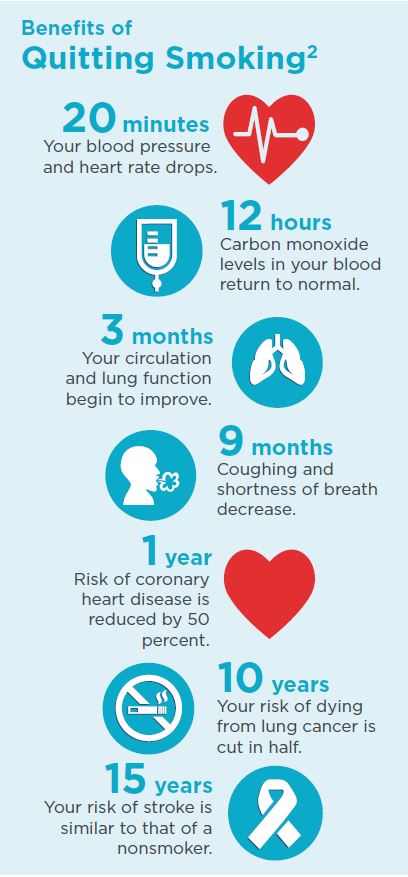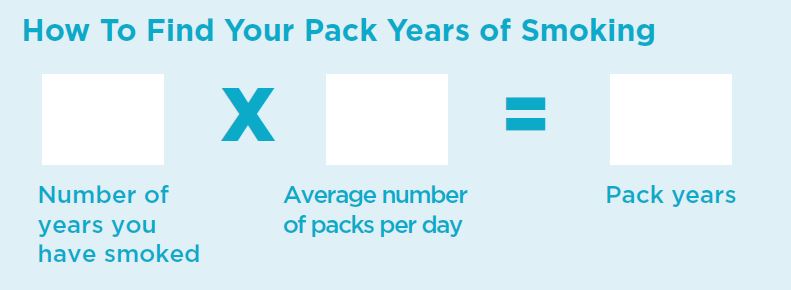Should I Consider Being Screened For Lung Cancer?
Lung cancer is the leading cause of all cancer deaths in the United States. For higher risk people, getting an early screening before symptoms start with a low dose chest CT for lung cancer screening (LDCT) can lower the risk of dying from lung cancer.
 The American Cancer Society recommends yearly LDCT lung cancer screening (lung cancer screening test) for certain people at higher risk for lung cancer who meet all of the following conditions:
The American Cancer Society recommends yearly LDCT lung cancer screening (lung cancer screening test) for certain people at higher risk for lung cancer who meet all of the following conditions:
- Are 50 to 77 years old and in fairly good health
- Currently smoke or have quit within the last 15 years
- Have at least a 20-pack year smoking history
- Receive smoking cessation counseling if they are current smokers
- Have been informed about the benefits, limitations, and possible harm of early screening with LDCT scans
If you are at higher risk for lung cancer, talk with your doctor about your private lung cancer screening options and ask for a referral to a screening center in your area.

Lung cancer screening is covered by Medicare and many private health insurance plans.
If you would like to be screened for lung cancer, we’re here to help.
Contact us at:
Edina: 612-614-3467
Early Screening for Lung Cancer
Lung cancer is the leading cause of all cancer deaths in the United States. It is estimated that over 228,000 new cases will be diagnosed and approximately 135,000 people will die from lung cancer this year, although it is rare in people under the age of 45. Despite the high mortality rate, studies show that early detection can increase a patient’s chances of survival.
Until recently, regular chest x-rays were used for lung cancer screening, but they did not have a significant impact on survival rates. However, new testing options, including low-dose CT scan (LDCT), can help find abnormal areas in the lungs that may be cancer. Research has shown that using LDCT scans to screen people at higher risk of lung cancer saved more lives compared to chest x-rays. For higher risk people, getting yearly LDCT scans before symptoms start may help lower their risk of dying from lung cancer.
Lung cancer is more likely to be successfully treated when found at an earlier stage, when it is small and before it has spread to other areas. Typically, the symptoms of lung cancer do not appear until the disease has progressed to an advanced stage, therefore, screening is meant to detect cancer in those who are asymptomatic.
The American Cancer Society (ACS) recommends lung cancer screening for people who are at higher risk. Those who are former smokers and between the ages of 55-74 should get yearly lung cancer screening for smokers with LDCT scans. To get the most benefit from screening, patients need to be in fairly good health. Those with serious medical conditions are not good candidates for early screening. Patients with metal implants in their chest or back should also not be screened with CT scans for lung cancer.
Lung cancer screening is covered by Medicare and many private health insurance plans.
If early screening shows an abnormal finding, more testing will be needed to confirm a diagnosis. However, most abnormal results are not cancer. CT scans of the lungs can also sometimes show problems in other organs in the field of view of the scans.
The National Lung Screening Trial (NLST) was a large clinical trial that looked at using LDCT of the chest to screen for lung cancer. The study included more than 50,000 people ages 55 to 74 who were current or former smokers and were in fairly good health. The study did not include people who had a history of lung cancer or lung cancer symptoms or those with other serious medical problems.
After several years, the study found that people who got LDCT had a 20% lower chance of dying from lung cancer than those who got chest x-rays. They were also 7% less likely to die overall (from any cause) than those who got chest x-rays.
There are some drawbacks to early screening with LDCT scans. Findings with abnormal results may lead to additional testing such as more CT scans, needle biopsies, or even surgery in some cases. These tests carry their own risks.
LDCT scans also expose people to a small amount of radiation with each test. It is less than the dose from a standard CT, but it is more than the dose from a chest x-ray.
Screening with LDCT will not find all lung cancers, and not all the cancers that are found will be found early.
Sources:
- American Cancer Society, About Lung Cancer, 2020
- American Cancer Society, Early Detection, Diagnosis, and Staging, 2020
- American Cancer Society, Can Lung Cancer be Found Early, 26 May 2020. https://www.cancer.org/cancer/lung-cancer/detection-diagnosis-staging/detection.html
- American Cancer Society. Last Medical Review 06 Feb. 2014. http:/cancer.org.
